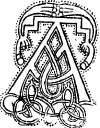
SECTION II.
The Law of Distraining: Definition and Scope

THGABHAIL is the word translated distress. It means the resumption or recovery of either property or right of which one has been deprived. What was meant for a definition in the Gaelic is translated thus—"It is called Athgabhail, because through it advantage is obtained after disadvantage, property after the absence of property, possession after non-possession, truth after untruth, legality after illegality, justice after injustice, lawful possession after unlawful possession, right after wrong, order after disorder. Athgabhail is a general name for every security by which one recovers his right. Athgabhail is that which renders good to the good, which renders evil to the evil, which takes the guilty for his guilt."
Whatever the law commanded or prohibited, the command or prohibition, if not obeyed, was enforced by means of distress. It was a remedy of almost universal application. It was available for the recovery both of tributes and of ordinary debts, thus corresponding to both distress and the final execution of a writ of fieri facias in English law; but it was equally applicable, and as freely used, for the recovery of all sorts of mulcts, forfeitures, penalties, and fines, and for the satisfaction of every species of liability. And since the Brehons reduced all liabilities of whatsoever original nature to material value to be recovered by distress, the modern distinction between civil and criminal liability did not exist, and distress was applicable to every action and to every charge. Further, it was not alone the mode of executing a judgment, but also a mode of instituting an action. Hence the disproportionate importance of this subject and the enormous amount of space occupied by it in the Brehon Laws; and hence in the part of the Senchus Mor dealing specially with it nearly all other branches of law are mentioned incidentally.
Whoever had any claim or complaint against another, either summoned that other or, by distraining, obliged that other to summon him before a brehon, who decided which party was in fault, and assessed the amount that person should pay to the other. There was no sheriff or other public officer to execute the distress and realise the amount assessed; the plaintiff, creditor, or person who had gained the suit was obliged to do it himself; but in doing so he was bound to take with him a law agent in the character of a notary, together with witnesses, as a guarantee that the requirements of the law should be duly observed on both sides. He also took with him such assistants as the occasion suggested. A person distraining in this way does not appear to have been any weaker or less successful than is the sheriff in our time. "If a man who is sued evades justice, knowing the debt to be due of him, double the debt is payable by him, and a fine of five seds." This provision made the defendant the party most interested in effecting a speedy settlement.

